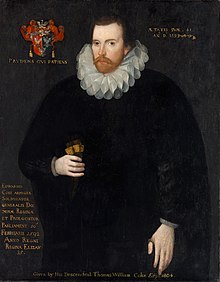Edward Coke
|
The Right Honourable Sir Edward Coke SL |
|
|---|---|
 |
|
| Chief Justice of the King's Bench | |
|
In office 25 October 1613 – 15 November 1616 |
|
| Appointed by | James I |
| Preceded by | Sir Thomas Fleming |
| Succeeded by | Sir Henry Montagu |
| Chief Justice of the Common Pleas | |
|
In office 30 June 1606 – 25 October 1613 |
|
| Appointed by | James I |
| Preceded by | Sir Francis Gawdy |
| Succeeded by | Sir Henry Hobart |
| Attorney General for England and Wales | |
|
In office 10 April 1594 – 4 July 1606 |
|
| Appointed by | Elizabeth I |
| Preceded by | Thomas Egerton |
| Succeeded by | Sir Henry Hobart |
| Solicitor General for England and Wales | |
|
In office 16 June 1592 – 10 April 1594 |
|
| Appointed by | Elizabeth I |
| Preceded by | Thomas Egerton |
| Succeeded by | Sir Thomas Fleming |
| Personal details | |
| Born |
1 February 1552 Mileham, Breckland, Norfolk, England |
| Died | 3 September 1634 (aged 82) Godwick, Breckland, Norfolk, England |
| Nationality | English |
| Spouse(s) | Bridget Paston (died 1598) Elizabeth Cecil (died 1646) |
| Alma mater | Trinity College, Cambridge |
| Profession | Barrister, Politician, Judge |
Sir Edward Coke SL PC (/ˈkʊk/ ("cook"), formerly /ˈkuːk/; 1 February 1552 – 3 September 1634) was an English barrister, judge and, later, opposition politician, who is considered to be the greatest jurist of the Elizabethan and Jacobean eras. Born into a middle-class family, Coke was educated at Trinity College, Cambridge, before leaving to study at the Inner Temple, where he was called to the Bar on 20 April 1578. As a barrister he took part in several notable cases, including Slade's Case, before earning enough political favour to be elected to Parliament, where he served first as Solicitor General and then as Speaker of the House of Commons. Following a promotion to Attorney General he led the prosecution in several notable cases, including those against Robert Devereux, Sir Walter Raleigh, and the Gunpowder Plot conspirators. As a reward for his services he was first knighted and then made Chief Justice of the Common Pleas.
...
Wikipedia
